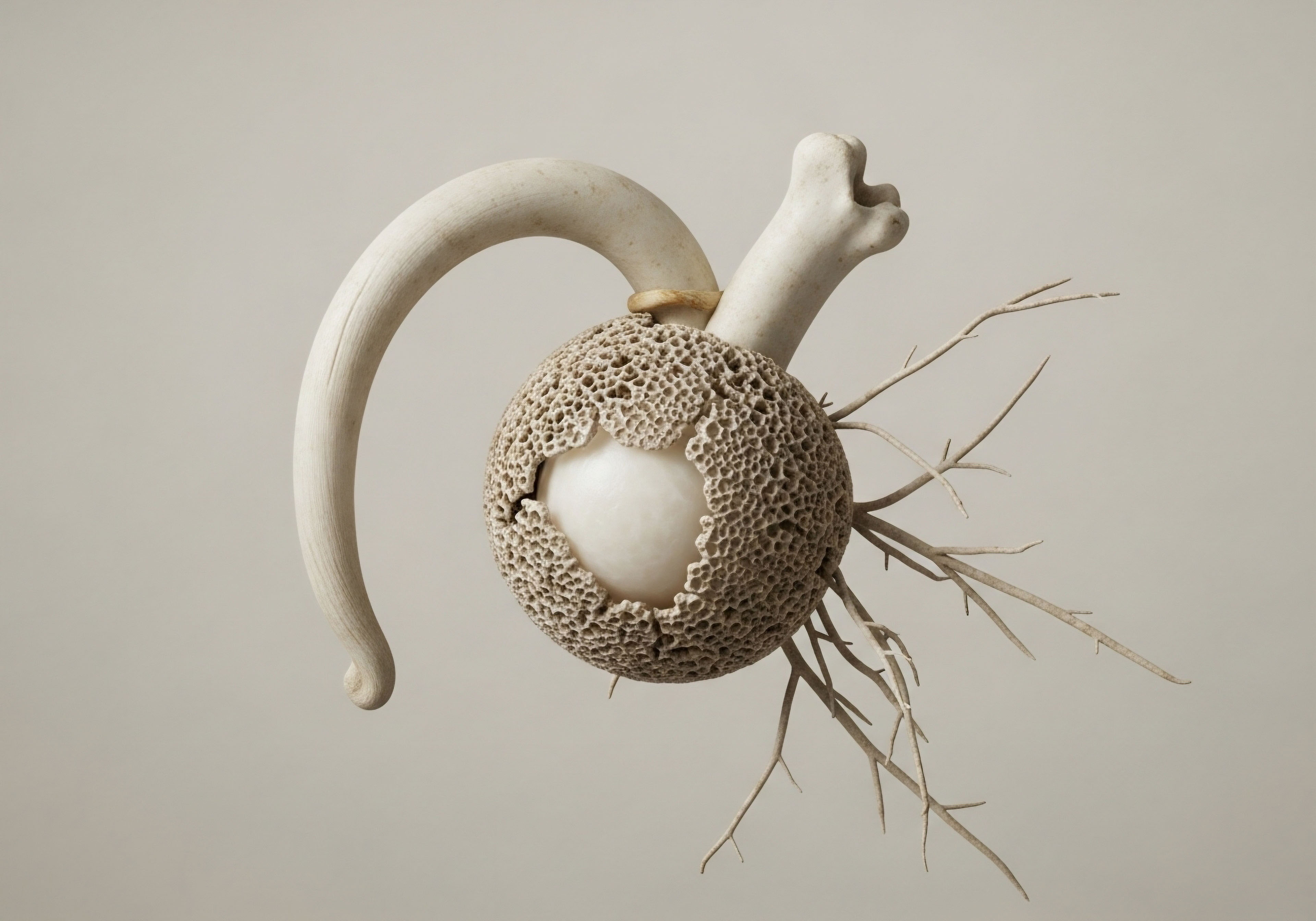

Reclaiming Vitality through Endocrine Understanding
The journey toward optimal well-being often begins with a profound awareness of our body’s intricate systems. For many men, a subtle yet pervasive decline in vitality ∞ marked by persistent fatigue, diminished drive, or changes in body composition ∞ signals a shift within the endocrine landscape.
These are not merely the inevitable consequences of time; they represent the body communicating an imbalance. Understanding these signals marks the first step in restoring function and reclaiming a robust existence. Our focus here centers on the long-term cardiovascular implications for men receiving hormonal optimization, particularly testosterone replacement therapy, a subject often viewed through a narrow lens.
The endocrine system, a sophisticated network of glands and hormones, functions as the body’s master communication system. Testosterone, a primary male sex hormone, plays a role far beyond reproductive health, influencing metabolic function, bone density, muscle mass, mood, and, critically, cardiovascular health.
When natural testosterone production falters, a condition known as hypogonadism, men frequently experience a spectrum of symptoms that can diminish their quality of life. Addressing this deficiency with targeted protocols can profoundly influence systemic health, extending to the very resilience of the heart and blood vessels.
Understanding the body’s subtle signals represents the initial step in restoring robust function and overall well-being.

The Heart’s Hormonal Connection
The relationship between testosterone and cardiovascular health has been a subject of extensive scientific inquiry. Historically, some discussions raised questions about potential risks associated with hormonal optimization. However, a clearer understanding emerges from rigorous clinical investigation. Current research suggests that testosterone deficiency itself correlates with an increased risk of cardiovascular disease, including conditions such as myocardial infarction and heart failure. This association highlights the critical importance of maintaining physiological hormone levels for cardiac integrity.
Testosterone replacement therapy (TRT) aims to restore these levels, thereby alleviating symptoms of hypogonadism and potentially influencing systemic markers of health. The discussion surrounding long-term cardiovascular outcomes for men undergoing TRT demands precision, moving beyond generalized statements to examine specific biological mechanisms and clinical trial data. Our exploration will detail how endocrine recalibration impacts the complex machinery of the cardiovascular system, emphasizing a path toward sustained vitality.


Navigating Hormonal Optimization Protocols and Cardiac Health
For men considering or undergoing testosterone replacement therapy, a deep understanding of the specific clinical protocols and their physiological impact becomes paramount. The primary objective of TRT involves restoring circulating testosterone levels to a healthy physiological range, thereby mitigating symptoms associated with hypogonadism. This approach, when carefully managed, extends its influence to numerous bodily systems, including the cardiovascular system.
Modern hormonal optimization protocols typically involve a combination of therapeutic agents designed to achieve hormonal balance while minimizing potential side effects. A standard protocol often includes weekly intramuscular injections of Testosterone Cypionate, aiming for consistent serum levels. This foundational therapy is frequently complemented by additional medications.
Testosterone replacement therapy aims to restore physiological hormone levels, influencing systemic health, including the cardiovascular system.

Components of a Comprehensive TRT Protocol
- Testosterone Cypionate ∞ Administered via weekly intramuscular injections, this form of testosterone provides a steady release, helping to stabilize hormone levels.
- Gonadorelin ∞ Subcutaneous injections, typically twice weekly, support the body’s natural testosterone production pathways. This peptide helps maintain testicular function and fertility, preventing the suppression of the hypothalamic-pituitary-gonadal (HPG) axis that exogenous testosterone can sometimes induce.
- Anastrozole ∞ This oral tablet, often prescribed twice weekly, acts as an aromatase inhibitor. Its purpose involves preventing the excessive conversion of testosterone into estrogen, a process that can lead to estrogen-related side effects such as gynecomastia or water retention. Managing estrogen levels carefully optimizes the overall hormonal milieu.
- Enclomiphene ∞ In certain situations, Enclomiphene may be incorporated into the protocol. This medication specifically supports the levels of luteinizing hormone (LH) and follicle-stimulating hormone (FSH), further promoting endogenous testosterone production and preserving fertility.

Cardiovascular Considerations within TRT
Recent systematic reviews and meta-analyses provide a more comprehensive picture of TRT’s long-term cardiovascular outcomes. While earlier concerns existed, contemporary high-quality evidence suggests that TRT, particularly in men with documented hypogonadism, does not increase the risk of major adverse cardiovascular events (MACE). In fact, some analyses point toward a reduction in MACE, especially in individuals with pre-existing cardiovascular disease or significant risk factors such as diabetes or metabolic syndrome.
The mechanisms underlying these observations are complex. Testosterone contributes to favorable changes in lipid profiles, often reducing total cholesterol and low-density lipoprotein (LDL) cholesterol. It also plays a role in improving insulin sensitivity and reducing inflammatory markers, all of which represent significant factors in cardiovascular health. Furthermore, testosterone influences endothelial function and vasodilation, promoting healthier blood vessel dynamics.
However, a nuanced understanding requires acknowledging specific findings. The TRAVERSE trial, a large randomized controlled trial, demonstrated non-inferiority of TRT compared to placebo regarding MACE, yet it identified a higher incidence of cardiac arrhythmias, pulmonary embolism, and acute kidney injury in the testosterone group. This observation underscores the necessity of individualized patient assessment and vigilant monitoring during therapy.
A structured approach to TRT involves regular blood work to monitor testosterone, estrogen, and lipid levels, along with comprehensive cardiovascular risk assessment. This meticulous oversight ensures that the benefits of hormonal optimization are realized while mitigating potential adverse events.
| Cardiovascular Marker | Observed TRT Influence | Clinical Relevance |
|---|---|---|
| Major Adverse Cardiovascular Events (MACE) | No increased risk; potential reduction in specific populations | Overall cardiac safety and event rates |
| Lipid Profile (Total Cholesterol, LDL) | Reduction in total and LDL cholesterol | Atherosclerosis risk mitigation |
| Insulin Sensitivity | Improvement | Reduced metabolic syndrome and diabetes risk |
| Inflammatory Markers | Reduction | Systemic inflammation and cardiovascular risk |
| Cardiac Arrhythmias (e.g. Atrial Fibrillation) | Increased incidence in some trials | Requires careful monitoring, especially in susceptible individuals |
| Endothelial Function | Improvement, promoting vasodilation | Vascular health and blood flow |


Endothelial Function, Inflammation, and Arrhythmia Risk in Testosterone Replacement Therapy
The sophisticated orchestration of the male endocrine system profoundly influences cardiovascular physiology. Our deep exploration of testosterone replacement therapy’s long-term cardiovascular outcomes moves beyond aggregate event rates to scrutinize the molecular and cellular mechanisms at play, particularly concerning endothelial function, systemic inflammation, and the nuanced risk of cardiac arrhythmias. This analytical framework acknowledges the body as an interconnected system, where hormonal recalibration elicits widespread effects.
Testosterone’s influence on vascular endothelium represents a cornerstone of its cardiovascular impact. Endothelial cells lining blood vessels regulate vascular tone, coagulation, and inflammatory responses. Hypogonadism often associates with endothelial dysfunction, characterized by impaired vasodilation and an increased propensity for atherosclerotic plaque formation.
Testosterone therapy has demonstrated the capacity to restore endothelial integrity and promote nitric oxide bioavailability, a key mediator of vasodilation. This enhancement of vascular compliance directly contributes to reduced peripheral resistance and optimized blood flow dynamics, thus alleviating cardiac workload.
Testosterone therapy influences endothelial function, systemic inflammation, and cardiac rhythm, demanding a comprehensive understanding of its physiological effects.

Mechanistic Interplay with Systemic Inflammation
Chronic low-grade inflammation stands as a significant accelerant of cardiovascular disease progression. Testosterone exhibits anti-inflammatory properties, modulating the expression of various cytokines and adhesion molecules. For instance, it can reduce levels of C-reactive protein (CRP) and interleukin-6 (IL-6), both established biomarkers of cardiovascular risk.
This anti-inflammatory action extends to the vascular wall, potentially stabilizing atherosclerotic plaques and diminishing the likelihood of thrombotic events. The precise molecular pathways involve testosterone receptor binding in immune cells and its subsequent influence on gene expression, leading to a more quiescent inflammatory state within the vasculature. This intricate interplay highlights testosterone’s role as a systemic modulator of cardiovascular risk factors.
However, the relationship between TRT and cardiovascular health requires a multi-method integration of findings. While many studies suggest a beneficial or neutral effect on major events, specific adverse outcomes merit detailed consideration. The TRAVERSE trial, a landmark randomized controlled trial, while confirming non-inferiority for MACE, reported a higher incidence of cardiac arrhythmias, notably atrial fibrillation, in men receiving testosterone. This finding compels a deeper analysis of testosterone’s electrophysiological effects.

Testosterone and Cardiac Electrophysiology
The increased incidence of cardiac arrhythmias observed in some TRT cohorts prompts an examination of testosterone’s direct and indirect effects on myocardial excitability and conduction. Androgen receptors are present in cardiac myocytes, suggesting a direct hormonal influence on heart muscle cells. Testosterone can influence ion channel function, which governs the electrical activity of the heart. Changes in potassium and calcium channel kinetics, mediated by androgen receptor activation, could potentially alter action potential duration and refractoriness, creating a substrate for arrhythmias.
Furthermore, testosterone’s metabolic effects, while generally favorable, could indirectly impact cardiac rhythm. For example, shifts in electrolyte balance or fluid retention, particularly if not carefully managed with ancillary medications like aromatase inhibitors, could predispose susceptible individuals to rhythm disturbances. The interaction between testosterone, estrogen (through aromatization), and their respective receptors within cardiac tissue represents a complex hormonal dialogue that dictates electrophysiological stability. This intricate balance requires careful clinical titration and ongoing vigilance.
A comprehensive understanding also requires acknowledging the limitations of current data. While large meta-analyses provide statistical power, heterogeneity among studies regarding patient populations, testosterone formulations, dosages, and follow-up durations introduces variability. Future research demands more granular data on specific subgroups, genetic predispositions, and the long-term impact of various TRT protocols on cardiac electrophysiology. This will refine our understanding of individual risk profiles and optimize personalized wellness protocols.
| Pathway/Mechanism | Testosterone’s Role | Impact on Cardiac Health |
|---|---|---|
| Endothelial Function | Enhances nitric oxide production; improves vasodilation | Promotes healthy blood vessel tone; reduces vascular resistance |
| Systemic Inflammation | Reduces pro-inflammatory cytokines (e.g. CRP, IL-6) | Decreases chronic inflammation; stabilizes atherosclerotic plaques |
| Lipid Metabolism | Decreases total and LDL cholesterol | Reduces atherogenic lipid burden |
| Insulin Sensitivity | Improves glucose utilization | Mitigates metabolic syndrome risk; protects against diabetic vasculopathy |
| Cardiac Electrophysiology | Potential influence on ion channels; observed increased arrhythmia risk | Requires careful assessment of baseline cardiac rhythm and ongoing monitoring |
| Myocardial Remodeling | Supports healthy cardiac muscle structure | Maintains ventricular function and structural integrity |

What Are the Implications for Individualized Care?
The emerging understanding of TRT’s cardiovascular profile underscores the necessity of a highly personalized approach to hormonal optimization. A thorough pre-treatment cardiovascular risk assessment, including an evaluation of cardiac rhythm, becomes indispensable. Ongoing monitoring of not only testosterone and estrogen levels but also markers of inflammation and cardiac function provides the data necessary for precise biochemical recalibration.
This iterative refinement of treatment strategies, guided by both clinical data and patient experience, ensures that the pursuit of vitality aligns with the unwavering commitment to long-term cardiovascular well-being.

References
- The Inverse Association between Testosterone Replacement Therapy and Cardiovascular Disease Risk ∞ A Systematic 25-year Review and Meta-Analysis Analysis of Prospective Cohort Studies from 1999 to 2024. medRxiv, 2024.
- Lincoff, A. M. Bhasin, S. Flevaris, P. et al. Cardiovascular Safety of Testosterone-Replacement Therapy. New England Journal of Medicine, 2023.
- Patel, P. & Jahangir, A. New Studies Fail to Find Cardiovascular Risk with Testosterone Therapy. American College of Cardiology, 2015.
- The Inverse Association between Testosterone Replacement Therapy and Cardiovascular Disease Risk ∞ A Systematic 10 year Review and Meta-Analysis Analysis of Prospective Cohort Studies from 2003-2023. medRxiv, 2024.
- Vigen, R. et al. Testosterone therapy and cardiovascular events among men ∞ A systematic review and meta-analysis of placebo-controlled randomized trials. ResearchGate, 2025.

A Path toward Personalized Wellness
This exploration of hormonal health and its connection to cardiovascular vitality serves as an invitation to introspection. The knowledge presented here offers a deeper understanding of your own biological systems, providing a framework for engaging with your health journey with informed intention.
Recognizing the intricate dance of hormones within your body represents a powerful step toward reclaiming function and achieving sustained well-being. Your unique physiology dictates a personalized path, one where scientific insight and empathetic guidance converge to support your pursuit of an uncompromised life.



